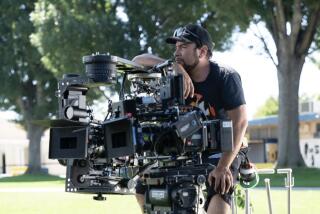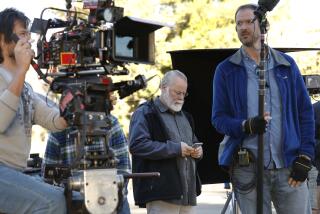Feuding Disrupts Filming of Comedy in Ireland : Movie: “Divine Rapture,” starring Marlon Brando and Debra Winger, has closed production.
- Share via
BALLYCOTTON, Ireland — The film “Divine Rapture” looked like a contender. Instead it is on the ropes.
The $16-million cornball comedy about miracles in small-town Ireland may need some outside intervention of its own to resolve the drama that has Marlon Brando, Debra Winger and producers on one side and its backer, CineFin Corp., on the other.
Producers Barry Navidi, Mark Crowdy and Demian Burger were left holding the bag in remote Ballycotton after CineFin partner David Lowe said the company wouldn’t pay.
CineFin blamed Orion Pictures, its U.S. distribution partner, accusing it of withholding paperwork needed to secure loans.
The collapse of “Divine Rapture” signals trouble for Paris-based CineFin and other projects under its care in Europe and North America.
The company announced several projects at the Cannes Film Festival, among them Tobe Hooper’s “The Dentist,” already in pre-production in Canada, and “Some Die Hot,” to be produced by Blake Edwards.
London Film Production Ltd. announced Friday it had stopped negotiations with CineFin to distribute the cinematic version of “Lady Chatterley’s Lover,” a BBC miniseries directed by Ken Russell.
On Saturday, the Independent newspaper in London said parties it did not identify were trying to revive the film, but a spokesman for Irish Arts and Culture Minister Michael D. Higgins said contacts were “very much exploratory.”
CineFin said it was too early to say if the project was gone for good.
“The dust is still clearing,” James Curry, a Century City lawyer representing CineFin, said Friday.
CineFin’s board includes Lowe, a British attorney, and brothers Fred and Richard Greenburg. One of the brothers’ earlier ventures, SkyPix, a satellite broadcasting company, filed for reorganization under the Bankruptcy Act in 1992.
Orion, the U.S. company fighting its way back from bankruptcy since 1992, last year agreed to distribute CineFin-funded movies in America. In turn, it pledged to cover a fifth of production costs once the films became available as home videos.
According to Navidi, CineFin provided $280,000 last month before freezing funds earmarked for “Divine Rapture” in Los Angeles.
“That was a puny amount, nothing, for your stars, your director, for everything--even your producers,” he said.
Curry said Orion had arranged with CineFin to provide 20% of the film budget--about $4.2 million--in exchange for U.S. release rights.
The contract called for a third party to guarantee the funding, but “numerous banks” rejected a proposal and refused to loan the money, he said.
He accused Orion of breaching the CineFin contract and called it inexplicable that the company didn’t come forward with an acceptable guarantee when 80% of the movie’s funding was in place. Calls seeking comment from Orion were not returned.
Navidi, who spent seven years trying to get a major Hollywood studio interested in the script for “Divine Rapture,” agreed last fall on terms with CineFin.
“Obviously Orion was part of the umbrella deal, but CineFin is responsible for the picture because they agreed to fund the movie,” he said.
Confidence grew as Navidi signed Brando, followed by Winger, Johnny Depp and John Hurt.
Filming started July 10 but stopped within a week as many of the 150 crew members went unpaid. Lowe flew to Ballycotton to assure cast and crew that their money was coming.
Navidi said the crunch came July 23 when Debra Winger checked her accounts in Los Angeles, and found she hadn’t received any of her promised $1.5 million.
She filmed three more scenes, Navidi said, “but we knew then we had to pull the plug. We were already beyond broke.”
The producers are approximately $2.5 million in debt, and dig deeper each day. The biggest individual loser was co-producer Demian Burger, who said he’s sacrificed $800,000.
Hurt said he’s never experienced anything “this surreal” in 35 years in the business--not even working in Michael Cimino’s legendary bomb, “Heaven’s Gate.”
Brando was the only person at the top end to get a substantial cut of his pay--a reported $1 million of his expected $4 million fee.
More to Read
The biggest entertainment stories
Get our big stories about Hollywood, film, television, music, arts, culture and more right in your inbox as soon as they publish.
You may occasionally receive promotional content from the Los Angeles Times.










